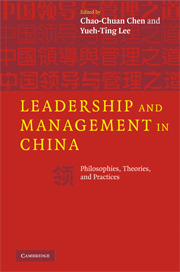Book contents
- Frontmatter
- Contents
- List of figures
- List of tables
- List of contributors
- Preface
- Acknowledgments
- Introduction: The diversity and dynamism of Chinese philosophies on leadership
- Part I The Confucian foundations
- 1 The Confucian and Mencian philosophy of benevolent leadership
- 2 Bridging Confucianism and Legalism: Xunzi's philosophy of sage-kingship
- Part II Alternative traditional Chinese leadership philosophies
- Part III Modern Chinese leadership theories and practices
- Index
- References
1 - The Confucian and Mencian philosophy of benevolent leadership
Published online by Cambridge University Press: 14 May 2010
- Frontmatter
- Contents
- List of figures
- List of tables
- List of contributors
- Preface
- Acknowledgments
- Introduction: The diversity and dynamism of Chinese philosophies on leadership
- Part I The Confucian foundations
- 1 The Confucian and Mencian philosophy of benevolent leadership
- 2 Bridging Confucianism and Legalism: Xunzi's philosophy of sage-kingship
- Part II Alternative traditional Chinese leadership philosophies
- Part III Modern Chinese leadership theories and practices
- Index
- References
Summary
This chapter focuses on the major teachings of Confucius and Mencius as they relate to leadership. Confucianism has had a great influence on people not only in China and the rest of East and Southeast Asia, but also elsewhere in the world. Confucianism is broad and complex and has relevance to politics, philosophy, education, psychology, morality and ethics, but this chapter focuses on exploring Confucian ideas related to benevolent leadership. We first briefly introduce the biographical details and historical backgrounds of Confucius and Mencius. Next, we introduce the Confucian philosophy of benevolence, which includes the assumption of human goodness and the prescription of key Confucian virtues such as benevolence (ren), righteousness (yi), ritual propriety (li), wisdom (zhi), trustworthiness (xin), and filial piety (xiao). Third, we elaborate on a benevolent leadership model that includes self-cultivation and leading others. We conclude by discussing the significance of Confucian benevolent leadership for modern business organizations.
Biogrphic and historical background
Confucius (551–479 BCE) is most widely known in China as Kongzi or Kongfuzi, with Kong being the family name, and zi or fuzi meaning master in Chinese. He is also known as Kong Qiu (Qiu is a given name) or Zhongni (a social name). We follow the latinized name of Confucius because it is well established in the literature outside China. Confucius was a native of the state of Lü (presently the city of Qufu in Shandong province, China) during the latter part of the Spring and Autumn Period (770–476 BCE).
- Type
- Chapter
- Information
- Leadership and Management in ChinaPhilosophies, Theories, and Practices, pp. 31 - 50Publisher: Cambridge University PressPrint publication year: 2008
References
- 22
- Cited by

